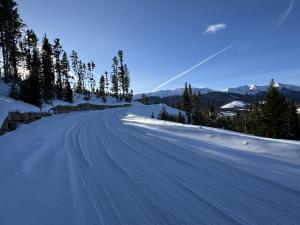Springs Concrete Urges Colorado Residents to Act Before REMP-Style Policies Increase Heated Concrete Driveway Costs
Expanding Policy Pressure on Snowmelt Infrastructure Because of Equity and Accessibility Concerns
Colorado’s changing policies make timing critical. Installing heated concrete driveways now protects both affordability and safety before new regulations drive costs higher,” said Daniel Flansburg.”
COLORADO SPRINGS, CO, UNITED STATES, October 28, 2025 /EINPresswire.com/ -- Springs Concrete Urges Colorado Homeowners and Developers to Act Before REMP-Style Policies Increase Heated Driveway Costs— Daniel Flansburg
As more Colorado municipalities explore Renewable Energy Mitigation Program (“REMP”)–style regulations, Springs Concrete, LLC is urging homeowners, developers, and property managers to act now before these policies substantially raise the cost of heated concrete driveway systems across residential, commercial, and multifamily sectors.
Springs Concrete — a nationally recognized, Colorado-based leader in electric and hydronic snowmelt systems — warns that new and proposed mitigation ordinances can nearly double installation costs through added fees, design restrictions, and renewable-energy offset mandates.
Background: Expanding Policy Pressure on Snowmelt Infrastructure
Colorado mountain towns such as Aspen, Breckenridge, Vail, and Telluride have enacted or proposed REMP-style codes requiring property owners installing outdoor snowmelt systems to offset projected energy use with on-site renewable generation or pay an equivalent fee to the municipality.
These regulations, originally targeted at luxury residential projects, are now being applied or extended to commercial properties, mixed-use developments, and multifamily complexes. In effect, businesses, HOAs, and developers face the same financial and permitting burdens as private homeowners.
While REMP programs are intended to promote sustainability, they often function as a duplicate cost layer on construction already designed to meet Colorado’s advanced energy-efficiency codes. The result is higher upfront cost, longer permitting timelines, and reduced incentive for investment in safety-driven improvements such as snowmelt systems.
By contrast, municipalities including Denver, Colorado Springs, Castle Rock, Buena Vista, and Parker have not adopted such policies, maintaining a balanced framework that supports both economic growth and responsible energy use.
Technical Overview: Electric vs. Hydronic Systems
Springs Concrete designs both electric radiant and hydronic glycol-based systems to meet site-specific demands across Colorado’s varied elevations.
Electric systems are ideal for moderate driveways and urban environments, using resistance cables for consistent surface heat.
Hydronic systems circulate heated fluid through durable PEX tubing beneath the slab, offering reliable performance for steep or long driveways and large-scale commercial or multifamily applications.
Modern control technology, including moisture and temperature sensors, allows these systems to operate only when needed — reducing energy consumption by more than 40 percent compared to older installations.
Equity and Accessibility Concerns
REMP-style mitigation fees have drawn attention from builders and homeowners alike for their disproportionate impact on residents with limited financial flexibility.
“Many homeowners who install heated driveways are not seeking luxury — they are solving safety issues,” said Daniel Flansburg, Founder of Springs Concrete, LLC. “For older residents, people with disabilities, and those managing chronic health conditions, a snowmelt system can be essential. These policies risk making safety unaffordable.”
Springs Concrete encourages residents in municipalities that already have such programs to engage in civic discussion by contacting city or town officials, submitting letters, and voicing their experiences.
“If people feel these fees are unfair, they should make their voices heard,” Flansburg added. “A balanced policy should account for medical, accessibility, and safety considerations — not assume every installation is an unnecessary luxury.”
According to the company, these mitigation costs ultimately affect everyone: rising project costs discourage installation, limit local job creation, and can leave residents with unsafe, ice-prone access points during Colorado’s long winters.
Advisory to Property Owners and Builders
Springs Concrete recommends that Colorado homeowners, developers, and general contractors:
Secure permits early to avoid new mitigation ordinances.
Evaluate design options for energy-efficient electric or hydronic systems.
Monitor local council agendas for upcoming REMP discussions or amendments.
Communicate concerns respectfully to municipal leaders if existing policies feel inequitable or burdensome.
Partner with experienced contractors who understand both technical design and compliance pathways for residential, commercial, and multifamily projects.
About Springs Concrete, LLC
Founded in Colorado Springs, Springs Concrete, LLC is a nationally recognized, Colorado-based authority in heated concrete driveways, walkways, and snowmelt systems. The company provides full-spectrum design-build services across electric, hydronic, and hybrid systems for residential, commercial, and multifamily properties throughout Colorado and across multiple states.
Daniel Flansburg
Springs Concrete, LLC
Daniel@springsconcrete.com
Visit us on social media:
LinkedIn
Facebook
YouTube
🔥 Hydronic Heated Concrete Driveway Installation | Colorado Experts ❄️
Legal Disclaimer:
EIN Presswire provides this news content "as is" without warranty of any kind. We do not accept any responsibility or liability for the accuracy, content, images, videos, licenses, completeness, legality, or reliability of the information contained in this article. If you have any complaints or copyright issues related to this article, kindly contact the author above.


